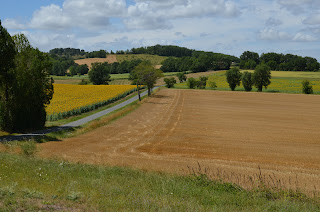Rev. Molly F. James, PhD
DFMS Noonday Prayer via Zoom
Feast of St. Ignatius, July 31, 2020
May God’s Word be spoken. May God’s Word be heard. May that point us to the living Word who is Jesus Christ our Lord. Amen.
Connect to God.
Give Thanks.
Review the Day.
Face Shortcomings.
Look to Tomorrow.
Those are the five elements of the Ignatian Examen. It seems fitting to revisit that practice today on the feast of Ignatius. Perhaps this practice is a familiar one to you? Perhaps it is one of the center parts of your spiritual life? In which case, I hope that today will be an opportunity for you to bask in the gift of that practice. If it is new to you, then I hope it will be fruitful and inspiring to think about how this practice or elements of it might be helpful to you in your own faith life.
Of course, St. Ignatius is known for his spiritual exercises and for founding the Jesuits. But the particular, personal nature of the Examen seemed worthwhile for us to sit with, together, today. It seems a real gift to us in this time when we are facing so many challenges, as individuals, as communities, as the world. The Examen is grounded in hope. And I would wager we could all use a little more hope these days.
Now for some of us it might be possible to find the uninterrupted time to do the Examen in one fell swoop at the end of our days (there is even an app to help us). For others of us that might be a bit challenging. So, I want to give us collective permission to honor the spirit of it, even if we are not able to honor the letter of it. Because really, if we can just find a bit more time, a few more ways to honor these practices, our lives will be enriched.
We begin with “Connect to God.” Well, I think we got at least some of that covered. We are here, after all. Connecting to God and each other in Chapel. Perhaps there is an invitation to us to find more of what we love about Chapel in our daily lives. Maybe that just means building more prayer time into our days (it is amazing what a minute or two of deep breaths and reflection can do). Or maybe it means reading more Scripture or more spiritual writings that inspire us. The news headlines will all still be there. They don’t always need to be the first and the last thing we look at on our phones.
“Give Thanks.” Remember that mystic and theologian Meister Eckhart said that if the only prayer we ever say is “Thank you” it will be enough. Giving Thanks to God is always a good idea. At various points in my life, particularly when I have been facing a challenging time, I have done the practice of keeping a gratitude journal. Just a short list, some notes each day about things for which I feel grateful. Even on the really hard days there are things, for which we can give thanks. Keeping our focus on gratitude helps us keep our perspective too. And it feeds our souls to be reminded that blessings abound, even in the midst of struggles.
“Review the Day & Face our Shortcomings”
I put these two together, because likely the act of giving thanks has already helped us to see all the joyful spots in our day. The challenge comes in facing the things that we feel we have not done well today. Oof. As many of you know, I consider myself a recovering perfectionist. I am very skilled at finding my shortcomings. The hard part is not focusing solely on them or letting them define me. I am grateful to the patient companions on the way who work with me to keep reframing the things I label as “mistakes” or “failures” as opportunities for growth and learning. That is an essential piece of this - we need to be sure that when we “face our shortcomings” we do not make it about berating ourselves, but rather about looking back through the day to see how we might learn from it. A wonderful mentor of mine had me keep a journal while I was doing an internship. Each day I was to reflect on two questions: “What did I teach myself today?” and “What would I still like to learn?”. Those are good questions for us to reframe the challenges of the day into opportunities for personal growth.
“Look to Tomorrow.” Indeed. Our Gospel today tells us that we cannot put our hand to the plow and look back. We cannot be a past oriented people. We must be a future oriented, hope filled people. We cannot know with any certainty what tomorrow will look like. We are particularly aware of that truth in these times, and of course, if we are honest, we realize that we have actually never had any guarantees. That is why we need faith, why we need hope, why we need each other. To be a people of faith means that we trust in that which we cannot see. Jesus does not promise us certainty or long lives or easy lives. Jesus promises us an abundant life. Jesus promises to be with us until the end of the age. And so that is where we put our trust, our faith. We put our trust in that which is eternal. We can follow Ignatius’ command to look to tomorrow because we know that no matter what may come our way, we will not be alone. The truth about who God is. The truth that we are beloved children of God. The truth that God is with us always. All of those truths will still be true tomorrow.
Saint Ignatius invites us to reflect on our days, on our lives that we might be drawn more deeply into relationship with God and brought more fully into the full stature of who God is calling us to be. I hope that you might find the elements of this Examen not a burden or another task to be completed, but rather as an invitation. An invitation to take from it what will serve you well. An invitation to learning, an invitation to growth, and an invitation to be more fully present to the abundant blessings which surround us each and every day. AMEN.






